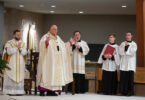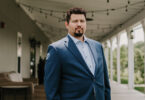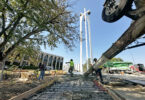by Elizabeth Fazzini
GREENSBURG, Pa. (CNS) — Back in 1974, a year after abortion was fully legalized in the United States, Katherine White was enjoying her senior year of college. Her parents were proudly anticipating her graduation; she would be the first college graduate in the family.
(Katherine White is not her real name.)
Then she started throwing up — and eventually missed a period. So White walked into a Planned Parenthood clinic for a blood pregnancy test. It was positive.
“When I found myself pregnant, I was in denial,” she said. “I was frightened. I was too ashamed to tell my parents.”
Yet White assumed her older boyfriend would support her. They would get married and have the baby.
“He didn’t want anything to do with it,” she told The Catholic Accent, newspaper of the Diocese of Greensburg.
Unlike today, it was a time in society when the stigma against unwed mothers was real. Catholics didn’t speak as freely about abortions, and there weren’t the clarion calls that helped people to understand that an embryo or fetus was actually a life.
Sonogram machines donated by the Knights of Columbus that allow a woman to see the life growing inside of her had not yet arrived. And abortions were no longer done in back alleys; they were a legal alternative to giving birth.
“It was billed as a simple procedure that would get your period restarted — back to normal,” White said.
She had the abortion at a clinic in Pittsburgh, and there was never any mention of the word “baby,” she said.
“I think deep down I probably knew, but in order for me to do that, I told myself that it truly wasn’t a child,” White said. “Nobody convinced me otherwise.
“I remember coming home back to my college dorm, and I just curled up in a ball for two days,” she said. “It forever changed me. I never ever spoke to anybody about that awful day — ever.”
“Ever” ended up being 40 years that she kept the painful truth inside herself, long after her college graduation.
White said that for a few years, she stayed away from the Catholic Church because she felt shame and estrangement from God, believing he no longer loved her. Fearful of God’s punishment, she abused alcohol and suffered from depression for many of these 40 years. And at all costs, she avoided reading anything about abortion; it was simply too painful.
During a bad time in 2015, White said she had an epiphany, in part, because she was spending time with pro-life advocates and, also, was hearing compassionate Year of Mercy messages. She realized that her issues stemmed from her inability to face what she had done decades ago.
“I just faced it,” White said. “I realized that I had truly taken a life. I knew I wanted to confess it.”
She sought a wise, compassionate priest and received the sacrament of penance and reconciliation.
“I was afraid of what a priest would think of me,” White said. Nevertheless, she went to confession.
“It set me on my healing journey,” she said. “It was just beautiful. When I was with him [the priest], I saw the hands and voice of Christ.
“I truly believe that God sent him to me because I was just suffering so much.”
But healing didn’t happen overnight, White said. She struggled to accept God’s forgiveness for her “unforgivable sin.”
“Abortion not only kills a child, it spiritually wounds a woman’s soul,” White said.
She continued to seek direction from her confessor, who helped her to realize she needed to humbly submit and accept the unmerited gift of forgiveness from God, who forgives all sins — even abortion.
“My confessor told me, ‘If we cannot accept that unwarranted gift from God, then we, in effect, ask Jesus to take our sins back to the cross,’ and do not believe his sacrificial offering was effective for overcoming our sin,” White said.
He also helped her to begin seeing her child in God’s loving arms.
The priest also recommended that White attend a Rachel’s Vineyard Weekend, a retreat that gives women and men an opportunity to accept and grieve their loss from abortion and ultimately move toward reconciliation and peace.
“I never thought I could discuss something so personal and painful with others,” she said.
But, ultimately, she found the courage.
“I wanted to grieve for my child, but I felt like I didn’t deserve to,” White said. “Rachel’s Vineyard allowed me to share my sorrow with other women who have experienced the same loss of a child through abortion. Our stories were different, but our anguish was the same.
“Not only do we deserve to grieve, it’s a needed step in our recovery, our healing.”
The “very healing” weekend with many, many tears allowed White to fully accept she was a mother who had a child.
“Before I referred to it as an ‘it,'” she said. “Now I pray to my child, and I ask him to pray for me.”
She envisions her child welcoming her into heaven.
Making reference to the Year of Mercy, White said, “I know what mercy is. I truly, truly get it.”
White attributes her healing to a combination of confession; ongoing discussion with her confessor; prayer; the Rachel’s Vineyard Retreat; and her ongoing relationships with the women she met at the retreat.
“I know that there are women out there in our churches who are suffering silently, as I did, and are in terrible pain,” White said. “You are not alone.”
She encourages women to receive the sacrament of penance and reconciliation.
“It will start you on your healing journey, and, more importantly, help you connect with your child.”
But the path is different for everyone, she said.
“It takes time, just as with any other loss,” White said. “You go through stages, but each day gets better. But you have to go forward.”
Acknowledging everything that was taken away from her so many years ago, White said, “My soul is at peace, and I know my child is at peace with Christ.
“I will one day be reunited with my child in heaven due to God’s endless love and mercy.”






